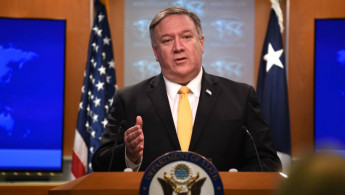US Mideast plan to discard old 'parameters': Pompeo
President Donald Trump's administration is expected to present an outline of a Middle East peace plan shortly after Israel's April 9 election, although the Palestinian Authority has rejected US mediation over Trump's landmark recognition of Jerusalem as Israel's capital.
"I'm very confident that what was tried before failed and I'm optimistic that what we're doing will give us a better likelihood that we'll achieve the outcomes that would be better for both the people of Israel and the Palestinian people as well," Pompeo said as he testified before Congress.
Pompeo repeatedly demurred when the committee's Democratic chairwoman, Nita Lowey, asked him if the Trump administration stood by the decades-old US position in support of a two-state solution between Israel and the Palestinians.
Pompeo said the United States wanted to "broaden the debate," when asked if a peace deal would focus as in the past on establishing borders, mutual recognition and the status of Jerusalem, Jewish settlements in the West Bank and Palestinian refugees.
"Those are the parameters that were largely at hand in the discussions before and they led us where we are today - no resolution," Pompeo said.
The US plan will be "grounded in the facts on the ground and a realistic assessment of what would get us a good outcome," he said.
The Trump administration has rallied behind Prime Minister Binyamin Netanyahu as the veteran right-winger faces a tough election.
Since taking office, Trump has moved the US embassy to Jerusalem, closed the Palestinians' office in Washington, pulled the United States from UN bodies accused of anti-Israel bias and cut off funding for the UN agency that provides schooling and other services to Palestinian refugees.
Representative David Price, a Democrat, questioned the approach, sarcastically asking Pompeo if the Palestinians should feel "grateful."
"This is the path forward, you're confident, to totally marginalise and alienate the Palestinian side?" Price said.
Speaking this week before the US pro-Israel lobby AIPAC, the US ambassador in Jerusalem, David Friedman, said Trump was pushing a peace plan because it would meet Israel's goals.
Friedman said the Trump administration understood that Israel faced an "existential threat" if Israel gave up security control of the West Bank.
"Can we leave this to an administration that may not understand that in the Middle East, peace comes through strength, not just through words on a paper?" he asked.
The remarks on Wednesday came after after President Donald Trump signed a proclamation on Monday stating it recognises Israel's annexation of occupied Syrian land, something considered illegal under international law.
Five European countries on the UN Security Council earlier rejected Trump's decision and voiced concern that the US move would have broad consequences in the Middle East.
Two of Washington's closest allies - the UK and France - joined Belgium, Germany and Poland to declare that the European position had not changed and that the Golan remained Israeli-occupied Syrian territory.
Three UN Security Council resolutions call on Israel to withdraw from the illegally occupied Golan.
The 30th Arab League Summit is due to take place in Tunis on Sunday, where the issue of the Golan will likely be discussed.
Follow us on Twitter: @The_NewArab





 Follow the Middle East's top stories in English at The New Arab on Google News
Follow the Middle East's top stories in English at The New Arab on Google News
![The UAE is widely suspected of arming the RSF militia [Getty]](/sites/default/files/styles/image_330x185/public/2024-11/GettyImages-472529908.jpg?h=69f2b9d0&itok=Yauw3YTG)
![Netanyahu furiously denounced the ICC [Getty]](/sites/default/files/styles/image_330x185/public/2024-11/GettyImages-2169352575.jpg?h=199d8c1f&itok=-vRiruf5)
![Both Hamas and the Palestinian Authority welcomed the ICC arrest warrants [Getty]](/sites/default/files/styles/image_330x185/public/2024-11/GettyImages-2178351173.jpg?h=199d8c1f&itok=TV858iVg)